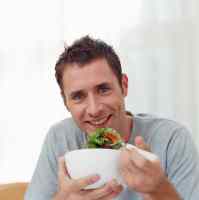Focus on Health: 4 Nutrients for a Healthy Colon
3/1/2013
Mom's chicken soup, cheese tamales, bread pudding - we all have our favorite foods. Unfortunately, what we like to eat isn't always good for our bodies. Consider colorectal cancer. Certain risk factors for the disease, such as being older than age 50 or having a family history, you can't avoid. But you may be able to keep your colon healthy by eating better. Try adding these four nutrients to your favorites list.

Folate
Popeye had this one right: Spinach is a powerful food. It's filled with folate. Also known as folic acid, folate is a type of vitamin B. It's instrumental in healthy cell production. That may be why research suggests folate can help prevent colorectal cancer. One recent study found that eating more folate, or even taking folate acid supplements, was associated with a lowered risk for the disease.
Not a fan of spinach? You can find folate in other vegetables like asparagus, romaine lettuce, broccoli, and Brussels sprouts, as well as in fruits, beans, nuts, dairy products, poultry and meat, and eggs. Breads and cereals enriched with folic acid are another source.
Calcium
Milk is a common staple in many refrigerators. That's likely because of its bone-building ingredients: calcium and vitamin D. But its calcium content may also help with colon health. A recent research review in the Annals of Oncology found that people who drank more milk were less likely to develop colorectal cancer. It's not entirely clear how calcium fights the disease. Its presence may help thwart the growth of cancer cells.
Don't "got milk"? Try these other calcium-filled foods:
- Yogurt
- Kale
- Salmon
- Foods with added calcium, such as breakfast cereals, fruit juices, and soy beverages
Whole-grain foods
Oatmeal and other whole-grain foods are good breakfast options, especially for your colon. Whole-grain foods are derived from cereal grains. Research to date has suggested that eating more whole-grains may protect you from colorectal cancer. That's because such foods are high in fiber. One recent study found that more fiber in your diet may lower your risk for this cancer by 17 percent.
Fiber-rich foods can help with other colon problems, too. They can ease constipation and irritable bowel syndrome. They also help with digestion.
Want more than oatmeal? Choose whole-grain versions of foods like pasta, barley, bread, and breakfast cereals. Brown rice, instead of white, is a good option, too.
Fiber-rich fruits
Like whole-grain foods, many types of fruit, including apples, are good sources of fiber. That puts them on the prevention plate for colorectal cancer. In fact, health experts, including the American Cancer Society, recommend eating more fruits, as well as their dietary cousin - vegetables - to help reduce the risk for many types of cancer.
Looking for more than an apple a day? Add these other fiber-rich foods to your diet:
- Pears, berries, and oranges
- Sweet potatoes, artichokes, and green peas
- Many types of beans, including navy, kidney, pinto, and lima
March is National Colorectal Cancer Awareness Month. Learn more about this type of cancer by taking this quiz.
Always talk with your health care provider to find out more information.
Back